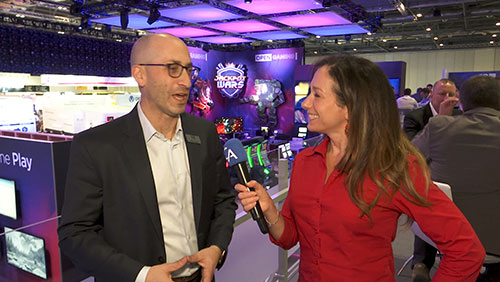Scientific Games continues to be a market leader in innovation, and it’s bringing in fantastic results by partnering with key players in the industry. To understand how their products keep drawing in new business, our Becky Liggero Fontana caught up with Jordan Levin, Executive Vice President and Group Chief Executive of their Digital division.
Scientific Games continue to add new features to their products, like social elements and long term objectives. “Some of them are actually live with customers already, doing very well,” Levin said. “They really provide players with more player entertainment, more than just like sort of straight ahead gambling, but also ways like missions are, ways when you’re chasing a goal for instance, jackpot wars, you choose your own robot and then face-off against somebody else that’s maybe in the game and win some type of big jackpot, compete for different types of prizes.”
Slots aren’t the company’s only great product though, as their sports betting product is also doing quite well. “Our platform I think, our platform is the best of both worlds,” he said. “You have sort of that legacy of reliability, and scalability, and trust from the Open Bet brand, you know, serving almost every tier one operator here in the U.K., a lot of the big WLA customers around the world, combine that with also sort of like, modularity, speed, some of the new products that we’ve invested in, like we have our Don Best acquisition from a year and a half ago that now drives our risk management and trading piece of the pie, We’re able to deliver mobile apps and solutions to customers, and it’s really got a lot of momentum right now. We’ve taken the business from one where we could be one big launch everybody one to one to two years, to now we were able to pop out many of these every quarter.”
That’s made a huge difference in the growing U.S. market, and Levin’s company is striking huge deals to be a leader in the region. “New Jersey’s been a great market for us, so from an iGaming perspective, we were one of the pioneers in that market,” he said. “I mean, NYX was in that market on day one, and today our platforms now drive over 50% of all casino gameplay in the market, and DraftKings is really interesting. We’re going to see this a lot in the U.S. market, where the leading sports betting brands are able to cross over with casino as well to their customers. So we’re seeing that with DraftKings, we’re also signing up a lot of new sports betting customers as well, we have many things going well for us right now that we’ve been selected by FanDuel and their parent company Flutter Entertainment, to drive their sports betting platforms of the future in the U.S. market so a lot of things are happening for us with a lot of momentum.”
While COVID-19 might be changing the world right now, when we spoke with Levin at ICE London, he expected great things in the American market’s future. “I saw a study that says within the next two years, fifty percent of the American population will have access to some type of sports betting, whether it’s online or retail,” he said. “Where we’re at right now, you’ve got maybe 20 to 25 states that have legalized sports betting, 3 or 4 that have legalized casino, so things are still sort of ramping up. Pennsylvania is starting to ramp up, you got Indiana starting to move pretty quickly, Michigan legalized iGaming and sports, we’ll be excited to launch there this spring with our first charter customer there.”
If the country can get back to normal, he expects that progress should only continue. “There’s a lot of things moving across America, and I think as more and more of these markets ramp up and jurisdictions start seeing the tax dollars flow in, you’ll start to see other states say, ‘Yeah it makes sense for us to do the same thing, and do it in a very regulated way through existing, whether it’s through lottery, through tribal operators, through you know, commercial brick-and-mortar operators.’”






